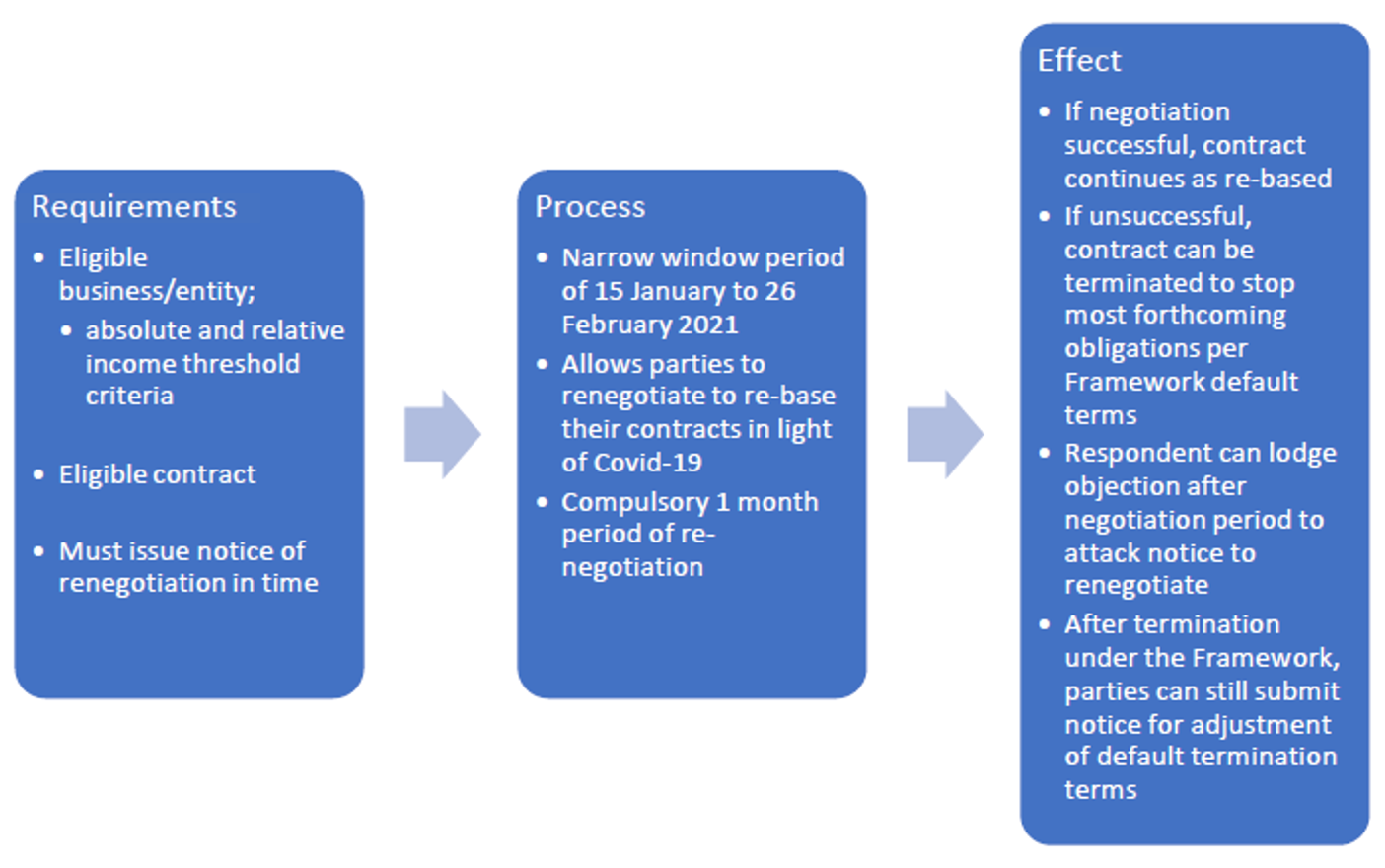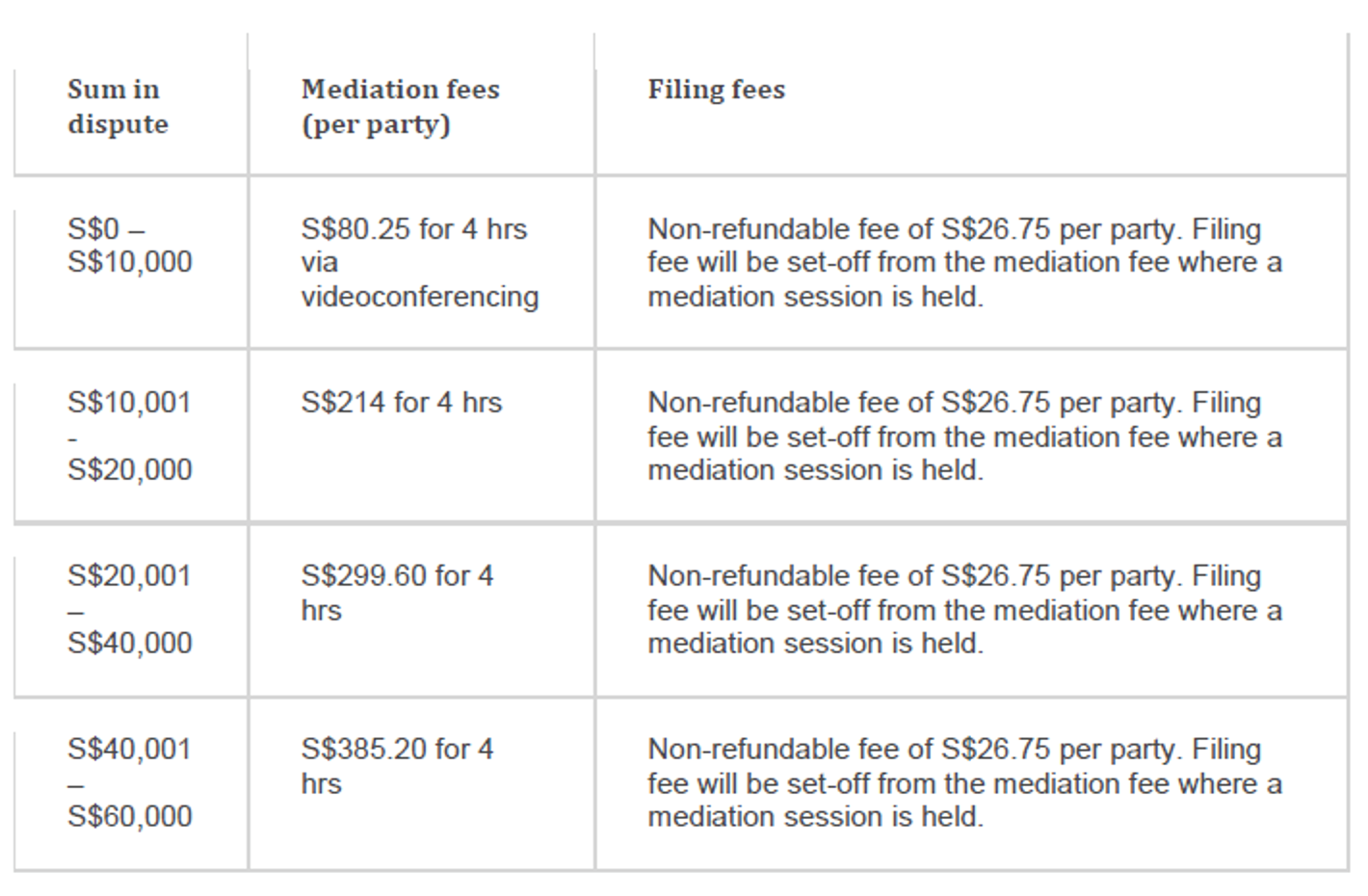First published on 17 February 2021.
The COVID-19 outbreak has triggered several rounds of statutory protection for vulnerable parties since the start of the pandemic.
The latest round involves allowing parties to renegotiate selected contracts for a month (recognising that the business operating environment has now fundamentally changed) and to terminate right after if renegotiation is unsuccessful.
Summary of framework

Some of the terms used herein have a specific understanding under relevant statute, and thus you should check the statutes or seek your own legal advice to ensure proper understanding.
Eligible businesses/entity (income criteria):
• Applicant’s 2019 annual revenue does not exceed SGD 30 million at global group level (absolute income threshold criteria); AND
• Applicant (at global group level) has experienced 70% drop in monthly average gross income for July-December 2020, compared to same period in 2019 (relative income threshold criteria).
Applicants can be companies/LLPs, individuals (e.g. freelancers), sole proprietors and eligible non-profit organisations. Businesses commencing business after 1 September 2020 are automatically excluded.
The type of supporting documents required to show eligibility can be seen here:
https://www.mlaw.gov.sg/files/ReAlign/ListofSupportingDocs.pdf
Eligible contracts/cut-off period
The Re-align Framework will apply to the following types of contracts (“Specified Contracts”):
• The contract is governed by Singapore law; AND
• At least one contracting party has a place of business in Singapore; AND
• Is a contract for any of the following types:
o Lease or licence for non-residential immovable property in Singapore for a term of 5 years or less;
o A hire-purchase or conditional sale contract for commercial equipment or vehicles (except those entered into with banks and finance companies regulated by the Monetary Authority of Singapore);
o Rental agreements for commercial equipment and vehicles; OR
o Contracts for the supply of goods and services.
These Specified Contracts must also have been entered into before 25 March 2020 (contracts after this date are not protected as they assume parties understood the long term effect of Covid-19 pandemic and willingly entered into legally binding relations with this in mind).
Added limited applicability to notice of termination/ terminated contracts from 2 November 2020
If notice to terminate a Specified Contract had been served on or after 2 November 2020, an eligible party may still invoke a notice of adjustment (see Notice of Adjustment commentary below) pursuant to the Framework as long as the eventual termination was not due to natural expiry/agreed termination/factors outside parties’ control.
Excluded contracts
The following contract types have been excluded from the Re-align Framework even if otherwise, the criteria would have been satisfied:
• Consumer contracts;
• Employment contracts;
• Insurance contracts;
• Leases or licences for non-residential properties for a term of more than 5 years or for residential properties;
• Contracts made in connection with a financial transaction or supply of financial services (e.g. loan agreements, insurance agreements, commodities agreements, factoring agreements) except for hire purchase agreements;
• Construction contracts including the supply of goods for constructions;
• Contracts for the carriage of goods for freight by sea, land or air;
• Contracts for the transfer of a business as a going concern; and
• Contracts to which the Sale of Goods (United Nations Convention) Act apply.
Narrow hard timeframe for availability of use/Terms in the Notice of Renegotiation
The Re-align Framework will commence on 15 January 2021. Applicants that wish to use the Framework will have a 6 week window period to serve a notice of renegotiation (“notice to renegotiate”) on the other party(ies) (“Respondent(s)”) between 15 January 2021 and 26 February 2021 (“notice period”).
Renegotiable terms include revision of price/rental amount, interest rate, time for payment (including amounts already outstanding, instalment proposals, extending or shortening contract term, termination and terms thereof.
Notice of Revision for Hirers
For hire purchase/equipment rental, a notice of revision can be used instead of a notice of renegotiation (they are mutually exclusive) if they fulfil similar income criteria. Eligible hirers are:
• A hirer under a hire-purchase or conditional sale agreement for commercial equipment;
• A renter under a rental agreement for commercial equipment or commercial vehicle.
It gives the hirers the option to stretch payment of outstanding arrears due from 1 February 2020 by proposing a revised repayment schedule of up to a period of 18 months, but it must be in equal instalments and on a monthly basis, with payments starting 26 March 2021, and interest capped at 5% or contractual interest rate, whichever is lower.
(https://www.mlaw.gov.sg/files/realign/Annex_B_Repayment_Scheme.pdf)
Procedure and available relief
The form for notice of renegotiation is available at:
https://go.gov.sg/notice-of-negotiation-corppass
https://go.gov.sg/notice-of-negotiation-singpass
If there are errors in the notice, it must be formally withdrawn and a new notice issued.
Procedure:
• After service of the abovesaid notice to renegotiate, a 4 week compulsory negotiation period (“negotiation period”) during which the affected parties are encouraged to renegotiate the terms of the contract starts. During this period, there is a moratorium on legal action on obligations falling due after the notice is served and breach of moratorium attracts fine on conviction up to $1,000.
• Mediation is possible if parties are agreeable under Singapore Mediation Centre:

If negotiations are successful:
• If negotiations are successful, the parties will proceed with the renegotiated contract, or terminate the contract, on the independently mutually agreed terms.
If negotiations are unsuccessful:
• Any Respondent may, within 2 weeks after the end of the negotiation period and not before (“objection period”), lodge a notice of objection (“objection notice”) with the Registrar of Assessors, and serve a copy of such objection notice on the Applicant and other parties interested in the contract. The notice of objection may be lodged for the following purposes:
o The Recipient who lodged the notice of objection objects to the Applicant’s satisfaction of the eligibility criteria for the Re-align Framework (eligible business or contract), or irregularity / failure / invalidity of service of the notice of negotiation
Notice of Compensation for eligible landlord
A landlord may choose not to/be unable to file a notice of objection but can still ask compensation.
o Such landlord must be an individual, sole proprietor, or a company incorporated to hold immovable properties;
o the rental income from the property amounts to more than 50% of its average gross monthly income; and
o its gross annual income does not exceed SGD 107,500.
If the criteria are satisfied, the eligible landlord will be eligible for hardship relief and the Assessor will determine the compensation to be paid for the termination
After notice of objection/compensation:
• Where a notice of objection or notice of compensation has been lodged, the Registrar of Assessors will appoint an Assessor to make a determination on the relevant notice.
• Assessment: Will be conducted over email by Assessor (no charge to parties), unless Assessor deems otherwise and orders online (via Webex) or physical hearing. No appeal possible against Assessor’s decision, which is enforceable as if Order of Court. Parties not attending are deemed to have withdrawn their notice if they were applicant, and hearing can proceed in their absence
• If no notice of objection is lodged or the Assessor has determined that the notice of objection is invalid, the contract will be deemed terminated two days after the objection period ends or per parties’ agreement.
• If the parties do not agree with the default terms, any party may (further) lodge a notice of adjustment with the Registrar of Assessors and serve the notice on party(ies) interested in the contract, within 2 weeks after the end of the objection period. An Assessor shall be appointed by the Registrar and will make a determination (same procedure as “Assessment” above). A Notice of Adjustment is meant to adjust the default terms of termination (see below for default terms) on a fair and just basis but is not meant to commercially re-write the existing contract and its commercial terms.
Effect/Relief thereafter – default consequences upon termination
Upon termination, the following consequences apply depending on the type of contract and outcome of any notice of adjustment assessment
(https://www.mlaw.gov.sg/files/ReAlign/2020-COVID-INFO3_Terms.pdf):
• Lease or licence for non-residential property: the tenant must reinstate the property and deliver up vacant possession in accordance with the contract on or before the date of termination, failure to do so will result in the tenant being liable to the landlord for any loss caused by such failure. The tenant will continue to be liable for any rent accrued prior to termination, and other sums accruing prior to the termination. The landlord will be required to return any security deposit within 4 weeks of the termination (less any set off).
• Contracts for supply of goods or services: the parties will be liable to pay for services or goods delivered/performed prior to termination, for loss (costs) incurred on or before the date of termination. Parties will not be liable to pay any sum that would have been required to be paid for termination or repudiation otherwise. The parties shall refund within 4 weeks of termination any security deposit or advance payment for services or goods not yet performed as at the date of termination.
• Hire purchase or conditional sale agreements: the hirer shall return the good to the owner on or before the date of termination, and pay to the owner the value of the remaining instalments for the period after termination LESS the value of the good at time of termination. If in default, the hirer will be liable to pay for the cost of the owner repossessing the good and the cost to sell the good if any. The hirer will continue to be liable for any amount accruing prior to termination but shall not be liable for any early termination fee or insurance.
• Lease of commercial equipment: the lessee must reinstate the commercial equipment in accordance with the contract and return to the lessor on or before the date of termination and shall be liable for any loss caused by default. The lessee continues to be liable for any breach occurring prior to termination, but shall not be liable to any sum payable for repudiation or termination, or other sum in relation to the period after termination. Similarly, the security deposit (after set off) should be returned within 4 weeks of termination.
The following terms shall survive the termination of the contract:
• Governing law or jurisdiction clauses;
• Dispute resolution clauses requiring alternative dispute resolution (e.g. negotiation, mediation etc.);
• Terms relating to confidentiality;
• Restraint of trade clauses;
• Terms excluding liability for:
o Breach of contract;
o Breach of obligation under any written law or rule of law; or
o Other breach of duty;
• Any warranty in respect of any goods delivered or services performed on or before the date of termination.
Disclaimer
The information in this article is correct as of the date of this article. The article does not constitute legal advice in any way. If you require advice in relation to the contents of this article, please approach us for further assistance.
—
Authors: Lim Ming Yi, Yeo Shan Hui, Jaryl Lim, Gabriel Kwek.